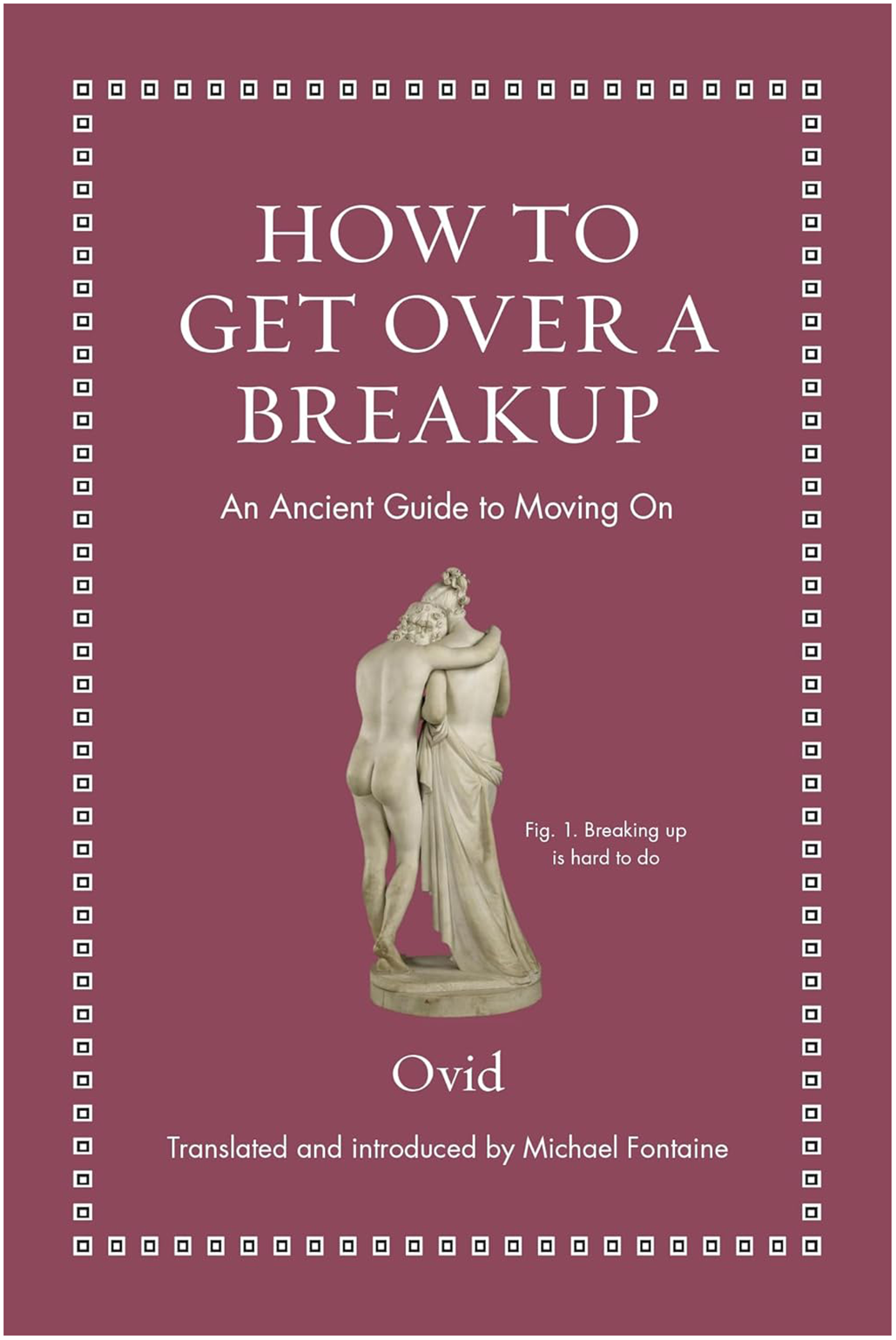
Fontaine’s Ovid: How to Get Over a Breakup. An Ancient Guide to Moving On offers a fresh and engaging interpretation of Ovid’s Remedia Amoris, recontextualizing the Roman poet’s work for a modern audience. Part of Princeton University Press’s Ancient Wisdom for Modern Readers series, the book presents Ovid’s witty and pragmatic approach to love and loss, providing both a translation and an insightful commentary on its relevance today.
One of Fontaine’s primary achievements in this book is his ability to render Ovid’s Remedia Amoris in a way that is both faithful to the original Latin and engaging for a modern audience. Rather than opting for a strictly literal translation, he adopts a conversational tone that captures the humour and wit of Ovid’s poetry. This approach ensures that the text remains lively and digestible, particularly for students who may not have a background in Latin. Fontaine’s translation successfully conveys Ovid’s playful yet didactic voice, allowing his advice on love and heartbreak to resonate with contemporary readers.
Furthermore, Fontaine supplements his translation with explanatory notes and cultural commentary, ensuring that non-specialists can appreciate the nuances of Ovid’s references to Roman customs, mythology, and poetic devices. By contextualizing the text within its historical framework, he not only enhances comprehension, but also demonstrates how Ovid’s work engages with and subverts traditional Roman attitudes towards love and relationships. This approach makes the book particularly valuable for use in academic settings, where students can explore both the linguistic aspects of the text and its broader socio-cultural implications.
Fontaine’s commentary is where the book truly shines. He provides a detailed analysis of Ovid’s advice, framing it within both ancient and modern contexts. He skilfully navigates Ovid’s blend of humour and serious counsel, illustrating how the poet manipulates literary conventions to craft a work that is at once self-help manual and satire. By emphasising Ovid’s rhetorical techniques, Fontaine encourages readers to critically engage with the text, rather than simply absorb it as prescriptive wisdom.
One of the strengths of Fontaine’s analysis is his exploration of gender dynamics in Ovid’s work. He acknowledges the inherent biases and limitations of a Roman male perspective on love while also highlighting moments where Ovid challenges traditional norms. This nuanced approach is particularly beneficial in an academic setting, where discussions of gender and power in classical literature remain essential. Fontaine invites students and scholars to consider the ways in which Ovid’s advice might be interpreted differently depending on the reader’s perspective, prompting discussions about the universality – or lack thereof – of his guidance.
Another notable aspect of Fontaine’s commentary is his ability to draw connections between Ovid’s work and contemporary relationship discourse. He relates Ovid’s advice to modern psychology, self-help literature, and cultural phenomena such as social media and dating apps. This comparative approach reinforces the timeless nature of Ovid’s insights while also highlighting the differences between ancient and modern approaches to love and emotional resilience. Such parallels make the text especially engaging for students, who may find Ovid’s humour and pragmatism surprisingly relatable.
From an academic perspective, Fontaine’s book serves multiple purposes. It functions as an accessible introduction to Ovid and Latin love poetry, making it an ideal supplementary text for courses on classical literature, Roman culture, and even comparative literature. The book’s clear structure and engaging style make it a useful tool for sparking discussions about translation, literary analysis, and historical context. Additionally, its modern framing encourages students to consider the relevance of ancient texts in contemporary society, fostering a deeper appreciation for classical studies beyond their historical significance.
Fontaine’s work is also valuable for students engaging with Ovid’s poetry for the first time. His commentary elucidates complex passages and poetic devices, making it easier for readers to grasp the artistry and rhetorical strategies at play in Remedia Amoris. Furthermore, by emphasizing Ovid’s playfulness and irony, Fontaine helps students recognise the interpretive challenges inherent in classical texts, encouraging them to think critically about authorial intent and audience reception.
However, while Fontaine’s adaptation makes Ovid accessible to a wider readership, some scholars may find his interpretative approach somewhat informal compared with more traditional academic analyses. The book prioritizes engagement over exhaustive scholarly debate, which may limit its utility in advanced classical studies courses. Nonetheless, its ability to introduce Ovid’s work to a broader audience and stimulate discussion outweighs any concerns about its academic rigour.
Fontaine’s Ovid: How to Get Over a Breakup. An Ancient Guide to Moving On is a remarkable contribution to both classical studies and popular literature. Through his lively translation and insightful commentary, Fontaine successfully bridges the gap between antiquity and modernity, demonstrating the enduring relevance of Ovid’s Remedia Amoris. The book’s accessibility and engaging style make it an excellent resource for students and educators, while its thoughtful analysis ensures that it remains a valuable addition to discussions of classical literature and its contemporary applications. Though some may critique its informal tone, the book’s ability to bring Ovid to life for a new generation of readers is an undeniable achievement.

